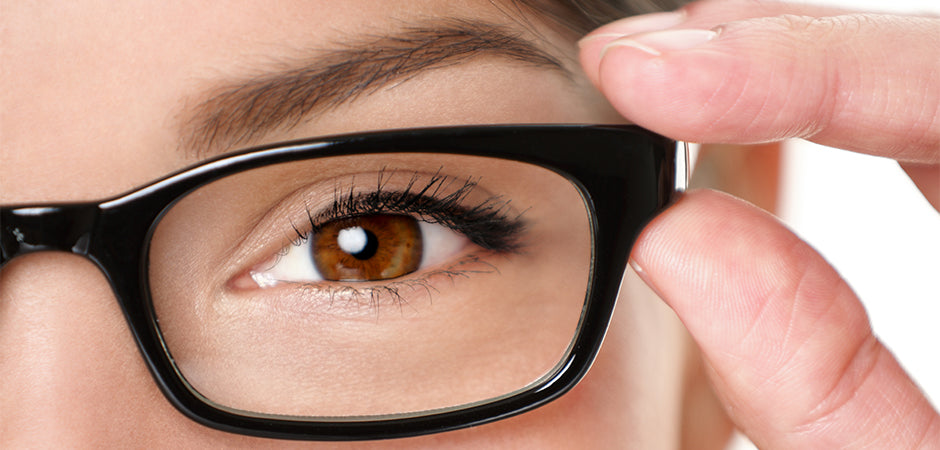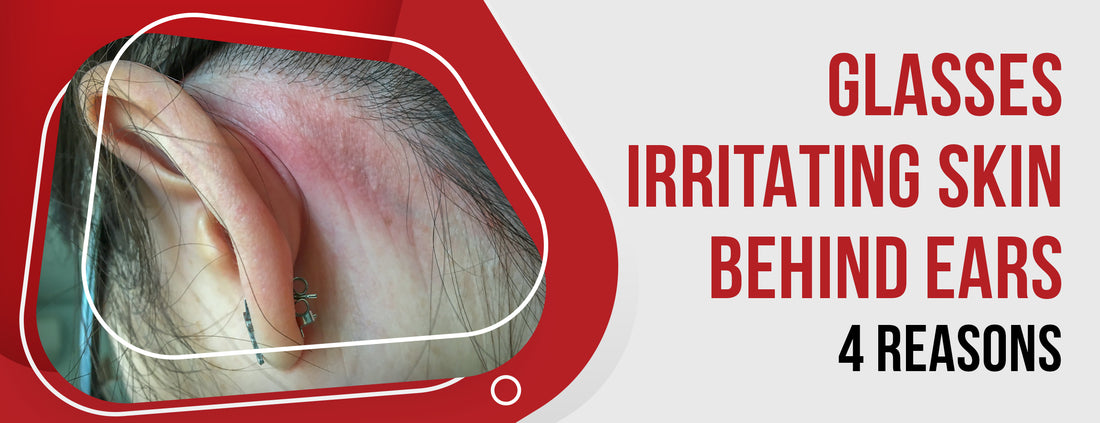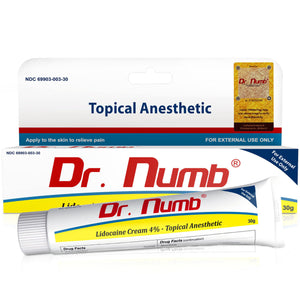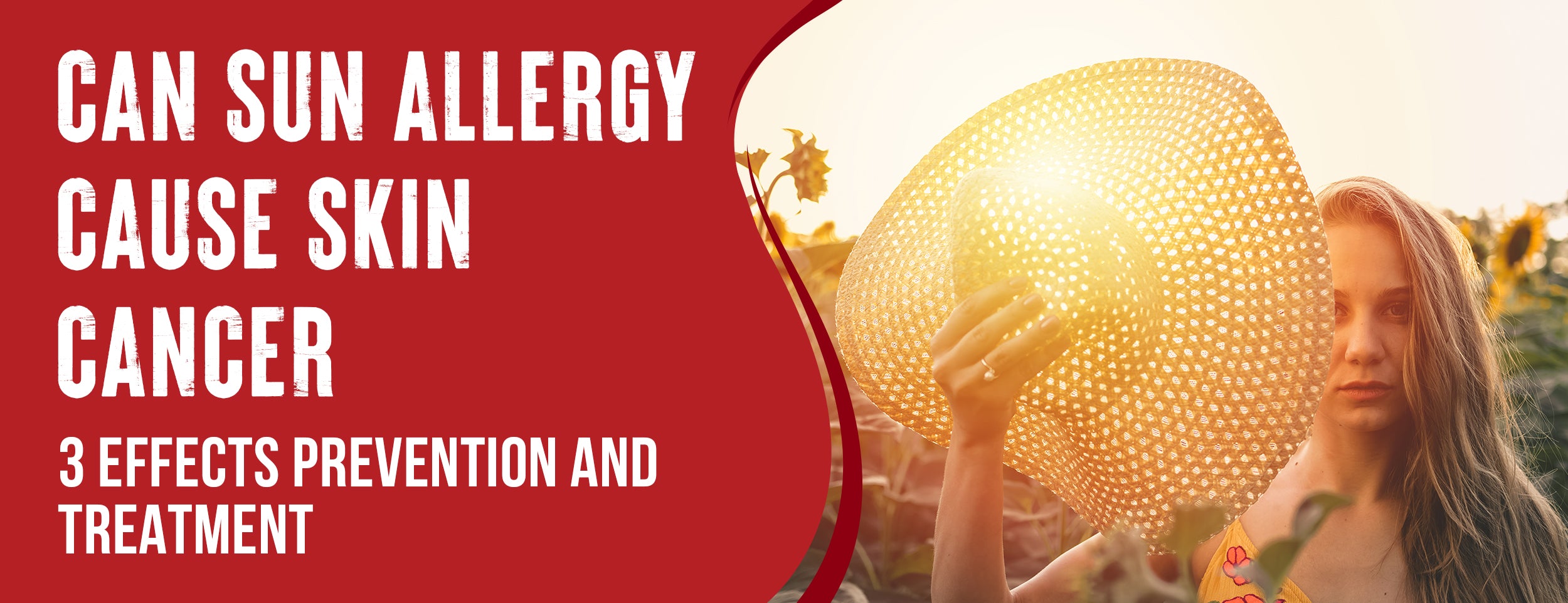The skin behind the ears is susceptible to atopic eczema. Symptoms include dry, itchy, and red skin that may vary in color. Scratching can lead to infections due to broken skin.
Your glasses may cause pain behind your ears if they are heavy, poorly adjusted, or don't fit well. To address this, have an optician examine them to pinpoint the issue. Adjusting the fit can alleviate discomfort.
Numbing creams like Dr. Numb® can temporarily relieve severe discomfort, though it's essential to address the underlying cause for long-term relief.
In this blog post, we'll dive deeper into the reasons & treatments for glasses-induced ear irritation and provide tips for preventing it.
Glasses Irritating The Skin Behind Ears: 4 Reasons

Let's examine some common factors causing your glasses to chafe the skin behind your ears.
Frame Size and Fit
Just like shoes, if your glasses don't fit right, they can be uncomfortable. Frames that are too snug or loose can rub against your skin, irritating.
- Perfect Fit: Make sure your glasses are the correct size.
- Time for a Tune-Up: If your glasses bother you, it might be time for an adjustment.
Weight and Material of the Glasses
The materials used in your glasses and their weight can also cause skin irritation. Some people may have allergies to certain materials, and heavier glasses can put more pressure on your skin.
- Know Your Materials: Be aware of which materials your glasses are made from.
- Lighten Up: Consider lighter frames to ease the pressure on your skin.

Length of the Temple Arms
The temple arms of your glasses - the parts that go over your ears. It must be the right length. Your skin can become irritated if they're too short or long.
- Measure Up: Check the length of your glasses' temple arms.
- Make Adjustments: Get them adjusted if they're not the right length.
Skin Sensitivity
Some people's skin is more sensitive than others. You might have sensitive skin if your skin gets irritated easily, not just by glasses but also by things like jewelry or certain fabrics.
- Care for Your Skin: Keep your skin clean and moisturized.
- Ask a Dermatologist: If you think you have sensitive skin, consider getting advice from a skin doctor. They can suggest treatments and ways to avoid irritation.
Treatment for Skin Irritation from Glasses

Wearing glasses can sometimes cause discomfort, especially behind the ears. But don't fret! There are several ways to handle this issue effectively. Let's explore some treatments for skin irritation caused by glasses.
Take A Break From Wearing Glasses
If your mirrors irritate your ears, a practical first step can be simply taking a break from wearing them. Here's why this can help:
- Your skin has a chance to rest and recover naturally.
- It can prevent the irritation from becoming even worse.
- After a short break, your glasses feel more comfortable when wearing them again.
Soothing Solutions: Barrier Creams and Moisturizers
A moisturizer or barrier cream for the irritated area can help relieve itching and promote healing. This works in several ways:
- It keeps the skin moist, preventing it from becoming dry and flaky.
- It acts as a protective shield against the friction caused by the glasses.
- It can help to reduce any redness or inflammation caused by the irritation.

Using Over-The-Counter Products
For more severe irritation, consider using over-the-counter products like hydrocortisone cream. Here's how this can help:
- Inflammation and redness are reduced, providing relief from discomfort.
- It can speed up the healing process by reducing swelling in the affected area.
- It's convenient to use and available in most pharmacies.
Medical Intervention: When to Seek Professional Advice
If the irritation continues despite trying these remedies, or if there are signs of an infection, it's essential to seek medical advice. This is crucial for several reasons:
- Persistent irritation could indicate an allergic reaction or other underlying health issue.
- A pus-filled wound or increased redness and swelling require professional treatment.
- It is possible to receive personalized advice and effective treatment options.
Conclusion
Dealing with glasses that irritate the skin behind your ears can be an uncomfortable experience. Understanding the causes, such as incorrect frame size and fit, weight and material of the glasses, length of the temple arms, and skin sensitivity, can help you address the problem effectively.
Remember, giving your skin some respite from the constant pressure, applying moisturizer or barrier cream, and using over-the-counter products like hydrocortisone cream can help reduce inflammation and soothe your skin. But if the irritation persists or shows signs of infection, don't hesitate to seek medical advice.
After all, your comfort is paramount when wearing glasses, and finding the right fit and taking care of the skin behind your ears should be a priority in your eyewear journey.











![The Most Common Food Allergies That Cause Itchy Skin [6 Common Symptoms]](http://drnumb.com/cdn/shop/articles/Can_Food_Allergies_Cause_Itchy_Skin__17_Listed_6_Symptoms_Common.jpg?v=1714999986)



